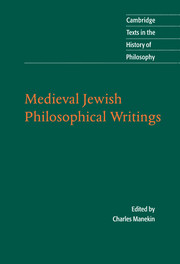Book contents
- Frontmatter
- Contents
- Introduction
- Chronology
- Further reading
- Note on the texts and translations
- 1 Saadia Gaon, from The Book of the Beliefs and Convictions
- 2 Solomon ibn Gabirol and Shem Tov b. Joseph Falaquera, Excerpts from “The Source of Life”
- 3 Moses Maimonides, from The Guide of the Perplexed
- 4 Isaac Albalag, from The Emendation of the “Opinions”
- 5 Moses of Narbonne (Narboni), The Treatise on Choice
- 6 Levi Gersonides, from The Wars of the Lord
- 7 Ḥasdai Crescas, from The Light of the Lord Treatise Two
- 8 Joseph Albo, from The Book of Principles
- Index
- CAMBRIDGE TEXTS IN THE HISTORY OF PHILOSOPHY
Introduction
Published online by Cambridge University Press: 05 June 2012
- Frontmatter
- Contents
- Introduction
- Chronology
- Further reading
- Note on the texts and translations
- 1 Saadia Gaon, from The Book of the Beliefs and Convictions
- 2 Solomon ibn Gabirol and Shem Tov b. Joseph Falaquera, Excerpts from “The Source of Life”
- 3 Moses Maimonides, from The Guide of the Perplexed
- 4 Isaac Albalag, from The Emendation of the “Opinions”
- 5 Moses of Narbonne (Narboni), The Treatise on Choice
- 6 Levi Gersonides, from The Wars of the Lord
- 7 Ḥasdai Crescas, from The Light of the Lord Treatise Two
- 8 Joseph Albo, from The Book of Principles
- Index
- CAMBRIDGE TEXTS IN THE HISTORY OF PHILOSOPHY
Summary
Jewish thinkers have been engaged with the fundamental questions of human existence from time immemorial, but, with the significant exception of Philo Judaeus, they began to compose philosophical treatises only in the ninth century of the common era. Philosophical speculation can be found in post-Biblical and rabbinic literature, albeit in rudimentary form, but philosophical writing in the manner of the Greeks achieves preeminent status among the Jews only in the Middle Ages. Why did the Jews compose so many works of philosophy between the tenth and fifteenth centuries, when they had produced virtually nothing beforehand? The phenomenon of medieval Jewish philosophy is all the more remarkable when one takes into account the often precarious nature of Jewish existence during this period, the need for institutions and financial resources to support a leisure class of scholars, the focus of rabbinic Jewish culture around traditional texts, and a Talmudic antipathy towards “Greek wisdom.”
Part of the answer is that medieval Jewish intellectuals combined a culturally ingrained sense of spiritual and intellectual superiority with an awareness of their deficiencies in the area of philosophy. On the one hand, they saw themselves as the sole heirs of a divine revelation that constituted not only a history of the world, but also a repository of all wisdom, theoretical as well as practical. On the other, they knew that only a small number of scholars of their faith had engaged in studying philosophical works, compared with the canonical books of Judaism, and that philosophical knowledge was to be found among the gentiles.
- Type
- Chapter
- Information
- Medieval Jewish Philosophical Writings , pp. vii - xxxiPublisher: Cambridge University PressPrint publication year: 2008

